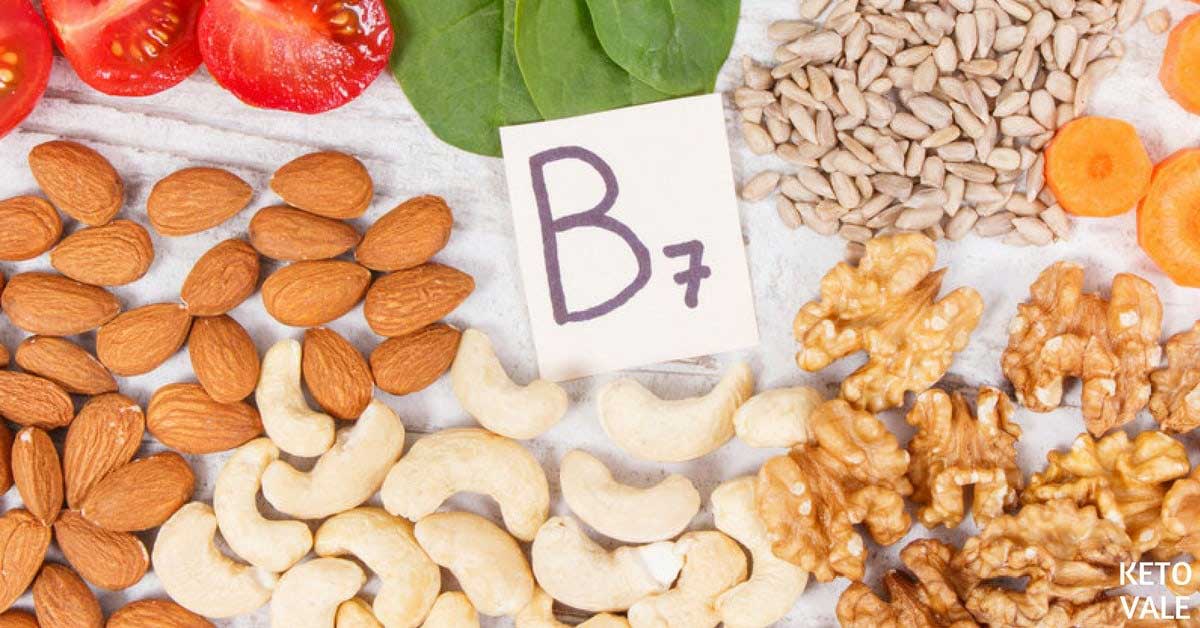Biotin is an essential vitamin that is generally recognized for its ability to thicken nails, prevent splitting and cracking. Biotin, a member of the B-complex vitamins, is also known as vitamin B7, is an enzymatic cofactor. It further plays a critical role in the metabolism of fats, carbohydrates, and protein.
Although biotin deficiency is relatively uncommon, it has been observed and investigated in the clinical literature.
Best Biotin
1. Biotin Pure + by Nuzena

Biotin Pure+ contains 10,000 mcg of pure Biotin as well as 176 mg of calcium. Additional ingredients include veggie capsule makeup with no added fillers or binders.
Nuzena uses only clinically studied and proven ingredients in all of their supplements. Their supplements are made with natural ingredients that are sustainably sourced and everything is manufactured in an FDA-registered facility that meets GMP standards. For these reasons, it’s our #1 pick.
2. Sports Research High Potency Biotin

Sports Research has primarily perfected the art of making natural supplements that you can rely on to be highly potent and deliver optimal results. Their biotin supplement is available in 2,500, 5,000, or 10,000 mcg dosages.
This compound is made with pure biotin enhanced with coconut oil for absorption purposes. The capsule is a veggie capsule and the ingredients list has nothing to be alarmed about. Each bottle comes with 120 capsules providing up to 4 months of supplementation.
3. Natrol Biotin Maximum Potency
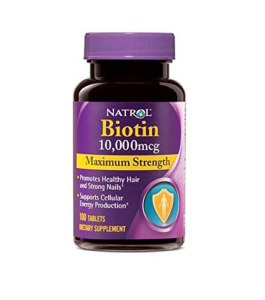
Natrol Biotin delivers a highly potent formula that comes in your selection of doses. You can choose 1,000, 5,000, or 10,000 mcg based on what you personally need or prefer. The tablets are small and easy to swallow. The tablets are designed to quickly dissolve so it gets to work in your body as soon as possible.
Natrol Biotin is vegetarian-friendly and flavored with a natural strawberry flavor. There are a few binders for the makeup of the tablets but nothing of concern.
4. Zhou Hairfluence
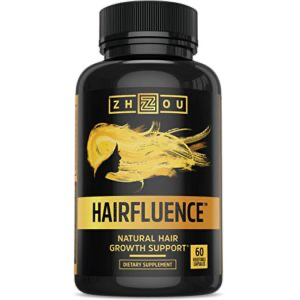
Zhou Hairfluence is a supplement built around biotin, specifically designed to support your hair, skin, & nails. This formula dives into vitamins and natural solutions to provide you with healthy hair that grows naturally.
This compound is a third-party lab tested and manufactured in a USA facility that is FDA-registered and complies with GMP practices. Zhou Hairfluence also includes various proteins like MSM, collagen, and keratin specifically for hair growth.
5. Solgar Super High Potency Biotin

Solgar is a long-standing supplement company that has provided the world with vitamins and supplements since 1947. Their biotin product is highly-potent with 10,000 mcg per serving.
Solgar’s biotin formula comes in vegan and vegetarian-friendly veggie capsules that contain no artificial flavors or sweeteners as well as no preservatives or artificial colors. This product is manufactured in a facility located in the U.S. that follows GMP principles.
6. Amazing Formulas Biotin Supplement
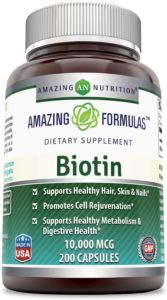
Amazing Formulas biotin formula comes in a highly potent 10,000 mcg dose. There are no fillers or additives to be concerned about and what is used meets quality standards.
Amazing Formulas biotin is manufactured in a GMP-certified facility that is located in the USA. The product is third-party lab tested and they even offer a money-back satisfaction guarantee.
7. Zenwise Health Extra Strength Biotin

Zenwise extra strength biotin is a 5,000 mcg formula designed to provide growth, health, shine, and nourishment to your hair, skin, and nails. Zenwise produces its biotin supplement in an FDA-registered, GMP-certified facility and all of its supplements undergo third-party lab testing to ensure you are truly getting quality and potent supplements.
The capsules are veggie capsules and the ingredient list is minimal with no additional fillers or binders that are concerning.
8. Healing Solutions High Potency Biotin
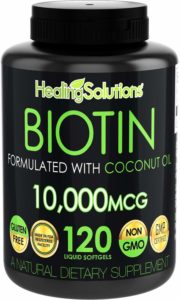
Healing Solutions contains 10,000 mcg and is formulated with coconut oil to give you the best absorption rate. This compound contains no additives or fillers and nothing artificial.
It’s manufactured in a U.S. facility that is FDA-registered and GMP-certified.
9. Physician’s Choice High Potency Biotin
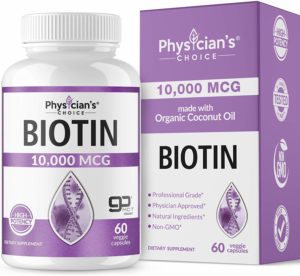
Physician’s choice earned themselves a spot in our ranks with this highly potent formula that contains 10,000 mcg biotin with organic coconut oil for maximum absorption.
The soft gels do not have any additional fillers or binders that are concerning. Physician’s choice biotin is made in an FDA & GMP-certified facility in the USA.
10. NOW Biotin
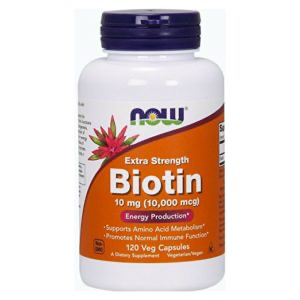
NOW provides natural solutions in supplements form and biotin certainly fits the bill. Their biotin formula is 5,000 mcg biotin in a veggie capsule that is both vegan and vegetarian-friendly.
This capsule is pure biotin and the veggie capsule contains no unnecessary fillers or binders. NOW biotin is kosher and is also manufactured in a GMP facility.
How We Rank
We stuck to biotin supplements that contained anywhere from 2.5 to 10mg per dose. Companies that allowed you to customize your dosages by providing smaller doses per capsule, like NOW Biotin, were rewarded. We did not include companies that contained more than 1omg (equivalent to 10,000 mcg) of biotin per serving since the safety at this dosage has not been evaluated.
We also looked at how the biotin was delivered. Biotin comes in a variety of forms, inducing pure capsules, gummies, and sprays. Capsules like Sports Research were preferred since they tend to contain less artificial sweeteners or fillers. For example, Havasu gummies contained sodium, excess sugars, and glucose syrups while Elevate gummies had malt syrup, sugar, and glucose.
Third, we reviewed the overall ingredient list. We preferred supplements like Natrol Biotin, who were pure biotin and nothing else. There is only one product in our ranks, Zhou, that is not solely biotin; however, this product has high levels of various Vitamin B extracts, which is where Biotin comes from.
We eliminated products that contained unnatural or overly processed ingredients as they simply hold no nutritional benefits and there are numerous options without these negative additives. Nature’s Bounty is one such product we eliminated as it contained artificial coloring and some additional ingredients that weren’t optimal choices.
Finally, we looked for quality assurances. This could be identified in 3 different ways: The product could be manufactured under GMP practices; the product could be third-party lab tested, or the product could have a quality assurance seal of approval. We gave priority to supplements that underwent third-party lab testing, like our number 1 pick Nuzena Biotin Pure, since they went the extra mile to provide a quality product and they don’t try to hide anything in the mix.
Benefits
1. Biotin helps with hair loss. Biotin deficiency has many possible symptoms, one of which is hair loss. The ability of biotin to stop hair loss has been evaluated in several clinical studies. While biotin deficiency can be linked to various underlying causes, supplementation with biotin appears to be effective in restoring biotin deficiency-related hair loss (1).
The antiepileptic drug, valproic acid, has been linked to causing biotin deficiency in some trials by reducing serum biotinidase activity (2).
Scientific evidence remains to be inconclusive, with some studies reinforcing, others contradicting these findings.
In one study, treatment with valproic acid was linked to dose-related adverse events, namely skin issues and hair loss. Patients and the control group underwent clinical and laboratory evaluations to determine whether biotinidase deficiency brought on these symptoms. Valproic acid was found to indirectly cause reduced biotinidase enzyme activity and or biotin deficiency (3).
Another study contradicts the above findings. The results of the trial showed that valproic acid treatment did not impact biotinidase activity. Of the 57 children treated with valproic acid, 3 of them experienced hair loss which was ultimately resolved after a 3-month supplementation with 10 mg of biotin daily. Serum levels of biotin and biotinidase activity remained normal in these patients for the entire duration of the trial (4).
2. Biotin may improve cardiovascular health. Biotin helps to reduce serum triglyceride levels. In an animal study, biotin supplementation reduced serum triglycerides by 35% (5).
This is an important finding as high triglyceride levels in the blood increase the risk of heart disease (6).
In 1980 a double-blind clinical study was conducted to look at the effects of biotin supplementation on plasma lipid levels. The trial included 40 men and women aged 30 to 60, randomly allocated into 2 groups. One group received 0.9 mg of biotin daily, and the other group received a placebo, both for a duration of 71 days.
In the biotin-treated group, statistically significant positive changes were seen in total lipid, total phospholipid, and in other plasma constituents when compared to the placebo group. There was an adverse relationship between biotin levels and total plasma lipids (11).
3. Biotin makes your nails stronger. In a clinical study, published in the Journal of American Academy of Dermatology in 1990, biotin was shown to increase nail thickness by 25% over a six months period in a group of women with brittle nails (7).
Several other studies since then have shown similar results. A 2017 review of articles concluded that biotin had been used with promising results in the treatment of various nail conditions. Due to the shortage of well-controlled clinical trials, there is a need for larger-scale studies to determine the optimum dose and to confirm its efficacy (8).
4. Biotin can help with type 2 diabetes. Glucokinase (GK) is an enzyme that plays an important role in glucose metabolism. Biotin stimulates glucokinase activity which controls insulin secretion (9).
In a 2013 study published in the Journal of Nutritional Biochemistry, 8-week supplementation with biotin increased insulin secretion, improved glucose tolerance with no impact on fasting glucose levels or insulin tolerance. These findings led the authors to conclude that biotin may have a positive effect on beta-cell function and with that on diabetes treatment and prevention (10).
One of the many complications of diabetes is peripheral neuropathy, a form of nerve damage causing loss of sensation, numbness and sometimes pain in the feet, legs, and hands.
In a study published in 1990, the effect of high dose biotin on severe diabetic peripheral neuropathy was assessed. The 3 diabetic patients in the trial were given high dose biotin for 1-2 years. Both clinical and laboratory findings showed marked improvement in all 3 patients (1).
5. Biotin plays a role in skin health. Biotin deficiency frequently manifests itself in skin issues. Some people may develop a skin condition called exfoliative or erythematous dermatitis as a result (11).
Exfoliative dermatitis is characterized by red, scaly patches on the skin.
While biotin is generally taken orally, a study tested its ability to get absorbed through the skin when applied percutaneously in the form of an ointment. In the trial, twenty patients with atopic dermatitis (eczema) and eleven healthy volunteers were included. Percutaneous application of biotin-containing ointment significantly raised serum biotin levels. The study authors concluded that biotin appears to be readily absorbed through human skin (12).
Biotin has a positive effect in treating chemotherapy-induced skin rash. In a small study involving 4 patients undergoing treatment for skin cancer with two different types of chemotherapy agents, biotin decreased skin rash brought on by the drugs (13).
6. Biotin may prevent congenital disabilities. Several studies have shown that biotin deficiency is relatively common in pregnant women (14).
The rate of women during pregnancy impacted by the condition may be as high as 50% (15).
Marginal biotin deficiency tends to be the highest during the first trimester, raising serious concern about the possible development of birth defects (16).
Biotin deficiency appears to be at least partially responsible for cleft palate formation (17).
Besides cleft palate, animal studies have demonstrated that a lack of maternal biotin can produce various different abnormalities, such as micromelia and micrognathia (18).
7. Biotin plays a role in immune function. Cytokines are small secreted proteins that act as chemical messengers, facilitating communications between the various cells in the body (19).
They interact with the immune cells, regulating the body’s response to fight infections caused by bacteria and viruses. Biotin supplementation increases the production of cytokines by affecting gene expression in human immune cells (20).
8. Biotin may have the potential to treat Multiple Sclerosis. Multiple Sclerosis (MS) is an autoimmune disease categorized by the degradation of the myelin sheath in nerve cells. Consequently, these nerve cells become damaged causing an array of issues (21).
Yet, many studies indicate the potential use of biotin in improving health problems in MS patients. A 2015 study explored the effects of high doses of biotin on 23 MS patients. 4 patients with visual impairments associated with the optic nerve reported improvements. 16 patients with spinal cord issues also had notable improvements.
The study concluded that biotin in such high doses may help stall the progression of the disease and reduce disability associated with it (22).
Another review and study in 2016 suggested similarly. Researchers hypothesized that high doses of biotin promote remyelination through myelin production and energy production. Other preliminary studies also reported the same. Yet, further research will help solidify these results (23, 24, 25).
9. Biotin is important for the metabolism of fats, carbohydrates, and protein. Numerous studies indicate the importance of biotin’s role in the metabolism of these macronutrients. Certain enzymes involved in these processes require biotin to function properly. In other words, it plays a critical role in the body’s energy production (26, 27).
10. Biotin can boost natural energy levels. Enzymes that are naturally produced by your body crave biotin in order to efficiently produce the energy you need every day. In this sense, biotin increases your metabolic rate directly related to carbs, fats, and proteins.
Biotin can help to initiate gluconeogenesis, which enables your body to find energy through amino acids and additional resources rather than simple carbs. It also boosts a process known as fatty acid synthesis which breaks down fatty acids in the body and translates them into valuable enzymes.
Biotin also aids your body in the breakdown of amino acids, which can be hard for the body to break down. However, the natural enzymes of biotin aid in this process.
11. Biotin can support women who are pregnant or breastfeeding. This is a stage of the body that greatly needs additional biotin in the body to rejuvenate enzymes and prevent the individual from developing a biotin deficiency.
While biotin deficiencies in pregnant and breastfeeding women are not typically severe, the deficiency is just enough to affect their overall well-being in a slight and underhanded maneuver. More than 50% of these women suffer from a deficiency that goes untreated and unresolved.
While there are no studies that show extreme side effects of not taking biotin while you are pregnant or breastfeeding, there is clinical evidence that suggests biotin deficiencies could lead to birth defects. Additionally, pregnant and breastfeeding women could need additional biotin to fully absorb the effects of the vitamin.
Side Effects
1. Biotin can skew blood tests. High-dose biotin supplementation may skew thyroid test results and mimic the laboratory pattern of Grave’s disease (28).
2. Biotin can cause IBS like symptoms. While most people can handle biotin supplements, some people report mild side effects like nausea and digestive issues. There are no known toxicity symptoms associated with too much biotin.
3. Biotin may cause skin issues. While biotin is used to maintain healthy skin, some individuals could experience adverse skin reactions when they take high doses. A common sign of this reaction is cystic acne which typically appears near the chin and along the jawline. This does not mean the individual cannot take biotin but simply that their body absorbs biotin differently than typical biotin absorption.
4. Biotin can negatively affect blood sugar. Excessive biotin could potentially cause your blood sugar to drop to dangerously low levels, particularly in individuals who take insulin on a routine basis. While biotin naturally reduces blood sugar levels, this is important for those with naturally low blood sugar to monitor. Additionally, biotin can also cause insulin to be released more slowly by the body which could cause heightened blood pressure and eventually could also cause blood clots or even stroke in extreme circumstances.
5. Biotin may interact negatively with certain medications. Biotin typically is safe to take with prescriptions and various medications. However, you should consult with your doctor if you take any type of medication for heart health, diabetes, or blood pressure as there have been side effects associated with these health ailments specifically. It is always a good idea to consult with your physician prior to taking a supplement so you can ensure the supplement will work well for you and that you shouldn’t experience a negative reaction to the supplement unexpectedly.
Recommended Dosage
Between 30 and 100 micrograms (mcg) per day of biotin is often recommended for adolescents and adults.
Biotin supplementation is frequently recommended to those with deficiencies or to pregnant women. A biotin deficiency may cause hair loss, high acidity levels in the blood or urine, skin rashes or infections, brittle nails, neurodegenerative disorders, and even seizures. Thus, it is essential to avoid biotin levels from falling too low.
There were no reported adverse events or toxicity in humans or in animals with oral doses up to 300 mg per day or with 20 mg daily dose administered intravenously (29, 30).
Overdose or toxicity with biotin is very unlikely because biotin is a water-soluble vitamin, and any excess amount will be excreted in the urine (31).
FAQ
Is biotin good for weight loss? Some supplement manufacturers also claim that biotin supplements can speed up metabolism and in turn promote weight loss.
Can biotin stop multiple sclerosis from developing? Studies indicate that MS symptoms may be minimized by high doses of biotin. However, more studies are needed to clarify and support this claim. For now, it is not used as a treatment for MS patients nor is it necessarily recommended.
How does biotin help the skin? If you don’t have enough biotin in your diet, it can lead to hair loss, brittle nails, or itchy skin.
How much biotin can you take in a day? It can also be taken as a supplement if needed. The recommended daily amount is 30 micrograms. However, taking biotin supplements is not recommended unless suggested by your doctor.
How long will it take for biotin to work? It takes at least three months to see the results of biotin.
Does biotin help hair growth? Biotin is one of several vitamins that play a role in the growth of healthier, thicker hair. It’s also one of the only natural hair loss treatments backed up by science, with study data showing that use of biotin produces a significant increase in hair growth in people with a deficiency.
Does biotin make your body hair grow? Yes, biotin will help all body and head hair grow better no matter the location.
Can you overdose on biotin? Biotin is a water-soluble vitamin, so any extra biotin in your body will flush out through your urine. This makes a potential overdose unlikely.
Does biotin cause acne? It’s not that biotin causes acne, but a deficiency in vitamin B5 will.
What are good natural sources of biotin? The best natural sources of biotin include organ meats, whole grains and cereals, almonds, cauliflower, egg yolk, peanuts, nut butter, bananas, mushrooms, pecans, soybeans, and walnuts.
Raw or minimally-processed versions of these foods contain more active biotin since cooking, and other food processing techniques tend to make biotin inactive.
Can you overdose on biotin? It is very difficult to overdose on biotin since it is a water-soluble vitamin. Water-soluble vitamins are carried to the body’s tissues but are not stored in the body. This means that when there is too much of it in the system, your body naturally gets rid of it via the urinary system.
Does biotin give you energy? Biotin helps your body produce energy in your cells and like most B vitamins he helps takes the foods you eat (fat, carbohydrates, and proteins) and converts them into energy. Taking biotin or other B vitamins by itself does not give you energy, it only helps create energy when combined with other nutrients and foods.
Can you take vitamin B instead of biotin? You can take Vitamin B rather than Biotin. However, be sure you are fully informed of your Vitamin B supplement. In order to get the same effects as taking biotin, you need Vitamin B7 as well as Vitamin H, which is extracted from Vitamin B. It is slightly more complicated than simply taking Vitamin B.
How much biotin should you take if you just want healthy hair and nails? Every individual reacts differently to biotin. However, if you are simply looking for healthy hair and nails we recommend that you take a simple dose of biotin – 2,500 mcg is the recommendation. Keep in mind that there may be underlying reasons you have brittle nails or hair loss and you may need to seek medical advisement.
Can you take biotin and vitamin B complex? There have not been any studies that show you can overdose on biotin. Your body eliminates the excess of these vitamins as they are water-soluble. For that reason, it is unnecessary to take mega doses or to mix both biotin and Vitamin B complexes together. You will not reap extra benefits by combining the supplements. Your body will extract what it needs no matter how much you take and then simply eliminate the rest.
Is biotin deficiency common? Biotin deficiency is relatively uncommon but has been observed and investigated in the clinical literature. People with a rare genetic biotin-responsive disorder called biotinidase deficiency are at particular risk for developing the condition. Pregnant women are also at a higher risk of developing a mild biotin deficiency. In fact, a biotin deficiency is frequently not detected in a laboratory setting. Frequently, symptoms, such as hair thinning, skin rashes, depression, fatigue, hallucinations, and tingling of the extremities, characterize a biotin deficiency.
What is biotinidase? Biotinidase is an enzyme responsible for recycling biotin and for making it bioavailable from dietary sources. People with biotinidase deficiency will require lifelong supplementation with biotin to avoid adverse neurologic consequences. The lack of biotin present in the breastmilk of some nursing mothers can also lead to the development of biotin deficiency in breastfed infants, which frequently leads to seborrheic dermatitis.
Recap
Vitamin B7, more commonly known as biotin, is a B vitamin. Like all B vitamins, biotin aids the body in breaking down carbohydrates, fats, and proteins for energy production. It also has roles in maintaining healthy skin, hair, and nervous system function and may help pregnant women and some people with diabetes.
It has very minimal side effects and almost no toxicity since it’s a water-soluble vitamin – meaning it is excreted via urine. However, even with minimal side effects, it is important to check with your family doctor before consuming any new supplements.
For Healthtrends #1 biotin recommendation, click here.
